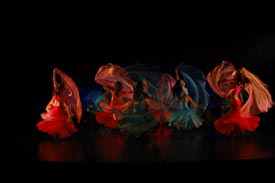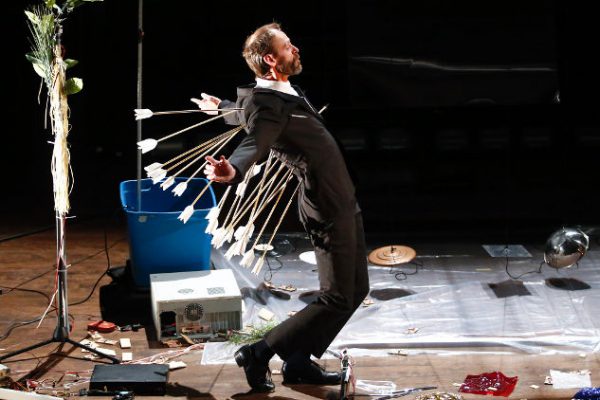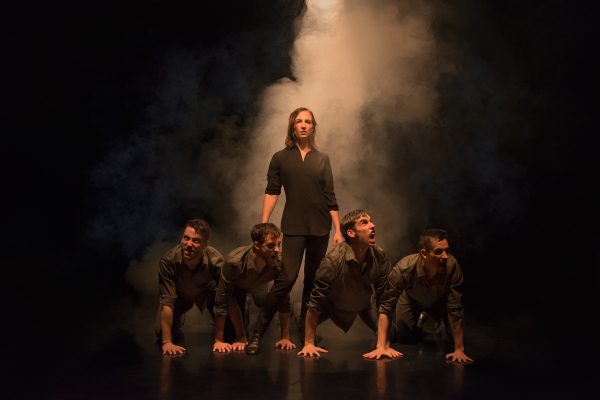The Chutzpah! Festival is always a sprawling celebration of Jewish culture through dance, theatre and music that takes place annually at the Norman Rothstein Theatre in the Jewish Community Centre. The seven-year-old festival has never had a strong dance line-up, although under the leadership of Mary-Louise Albert, now in her third year as artistic managing director, there has been a push to give dance a higher profile. Albert’s more than twenty years as a modern dancer prove her passion for the art form (she moved into her present organizational role after studying business administration with help from the Dancer Transition Resource Centre) but this year’s eclectic choices were hit and miss.
The culturally specific festival obviously places restrictions on programming — work doesn’t have to address Jewish concerns, but some connection to Jewish culture is expected. Having non-Jewish dancers perform with Jewish musicians is one way to fulfill the festival’s focus, as in the opening piece by Mozaico Flamenco Dance Theatre, “Los Sephardi” (“The Sephardic Jews”).
The music was courtesy of a trio of Jewish flamenco artists from Seattle: Marcos Carmona (guitar), Rubina Carmona (song and dance) and David Carmona (percussionist, and son of Marcos and Rubina). Rubina Carmona has an authoritative voice and the male Carmonas are captivating musicians but the show felt hastily assembled. Indeed, the collaboration between the Vancouver and Seattle artists reportedly involved mostly long-distance telephone calls. Also, I’m not fond of explanatory comments from performers during a show: it interrupts the creative flow on both sides of the footlights. I would have preferred to read Rubina Carmona’s introduction to the Sephardic songs in the program. The songs themselves, accompanied by flamenco rhythms and melodies, were a lovely musical prelude.
Rubina Carmona also performed a solo dance, a farruca, which she did with microphone in hand or clamped under her armpit. Aside from that, the dance was courtesy of Mozaico Flamenco’s artistic director, Oscar Nieto, and associate director, Kasandra, who both gave their usual committed performances. Kasandra’s lusty abandon in her “Solea por Bulerias” was a highlight.
The Chutzpah! festival’s one mixed bill, under the optimistic title Dance All-Stars, chugged along for about two hours. The real winner was James Kudelka’s “Soudain l’hiver dernier”, a 1988 duet about longing, support and resilience. Dancers Roberto Campanella and Robert Glumbek flew in from Toronto for their touching performances in this well-crafted work, set to Gavin Bryars’ haunting composition, “Jesus’ Blood Never Failed Me Yet”.
On the aural side, there was another frontrunner in the All-Stars bill: the spoken word poetry group The Fugitives, who provided vocal and piano accompaniment to Edmond Kilpatrick’s choreography, “Haunted”. Kilpatrick performed this lyrical modern duet with fellow Ballet BC dancer Simone Orlando, but I couldn’t take my eyes off The Fugitives’ Barbara Adler, Brendan McLeod and Mark Berube. Their percussive gestures and vocal energy had a sharp urban edge that left the dancers’ graceful, gently fraught moves looking as if they came from another world.
Alison Denham, an accomplished dancer but novice choreographer, presented “Lovedone”, a commission from the Chutzpah! festival, with music by percussionist Boris Sichon, cellist Eric Wilson and two Israeli singers, Raphael Seelig and Amnon Seelig. Again, the music was tough to live up to. The four black-clad men sat upstage, providing a varied soundtrack that included startling percussion and haunting vocals. To their musical delights, Denham and her partner, Billy Marchenski, spent a great deal of time standing on the spot embracing. Denham pitted her own great bursts of movement against the stillness, such as her long-legged tumbles across Marchenski’s rounded back. Marchenski was mostly cast in the old-fashioned role of porteur — concerned to facilitate the woman’s expressive poses and steps. Denham, in a tight red dress, had all the good moves!
Israeli/Canadian artist Asher Lev contributed two pieces. “The Kettle” had him pulling funny faces and performing funny walks while a kettle boiled. In an excerpt from “Avi Cohen”, he kicked around a stuffed dolphin as if it was a soccer ball and repeatedly broke into a manic cheerleader’s-style dance routine. I shall say no more.
“The Invisible Life of Joseph Finch” was originally created as an ensemble dance by choreographer Serge Bennathan for Toronto’s Dancemakers in 2000, and presented at the Chutzpah! festival in 2003. This year, it returned for its premiere as a one-man show written and directed by Bennathan (or “Serge Ben Nathan”, as he signed the program’s thank-you note), and starring actor Jonathon Young of the Electric Company Theatre.
From the very first scene — when the table at which Young sits begins to spin, disturbing huge stacks of paper and sending the pages sailing into the air — Bennathan directs the work with acute attention to visual effect. In Young, he has the ideal performer: an actor with a keen sense of physicality. Young brilliantly embodies the eighty-three-year-old violinmaker Joseph Finch, who is writing a letter to the long-lost daughter he is about to see for the first time since the liberation of Auschwitz. When Young recalls the stormy existence of Finch’s father, his body becomes a storm of flailing limbs; another time, he takes on the warm flamboyance of Uncle Hertzog. Young jumps onto tables and throws himself under them; he transforms his chair into a bicycle that takes him on a wild careening ride, his legs madly pumping. There is also naked exhaustion at Auschwitz and the awful separation from his young daughter.
The play’s dramatic development didn’t quite reach the astonishing invention of the staging, and somewhere during the ninety-minute show I disconnected from Finch and his story. Yet the whole thing is so imaginatively written and vividly staged that scenes from “The Invisible Life of Joseph Finch” happily remain with me some weeks later.
On the festival’s closing night, dancer and choreographer Judith Marcuse returned to the stage just days before her sixtieth birthday — after more than fifteen years away — in a solo created for the occasion called “Five Working Songs”. Her twenty-minute dance was filled with lively gestures and dramatic flourishes, and was fully engaging despite the fact that it contained no physical pyrotechnics. Alone on a bare stage, casually dressed and wearing runners, Marcuse’s friendly, confident and mature presence was a delight.
The work’s five vignettes were set to an eclectic soundtrack ranging from Bach’s “Wedding Cantata” to a traditional Ethiopian song. Although at times Marcuse seemed to be indicating something concrete through bits of mime, the solo was really about mood, which was clearly established by the music. Perhaps a commissioned score and some set design would make the story behind the dance more visible.
The evening concluded with the Feinsmith Quartet from the United States in a performance of Daniel Feinsmith’s “Elohim.” This was modern music at its most melodious — full of tension but with thrilling rhythm. I was surprised by how much I enjoyed the opportunity to concentrate on the sound — to just listen, free of the need to look.
By Kaija Pepper
Tagged: Festival, Performance, Various, BC





